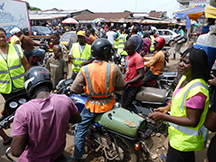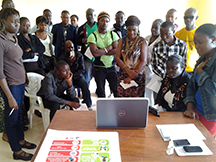Purdue Peace Project works from afar with fleet of Liberian taxi drivers to educate citizens about Ebola
August 14, 2014
 |
|
The Pen-Pen Peace Network in Monrovia, Liberia, will educate more than 1,500 motorcycle taxi drivers and their customers about safety concerns related to the recent Ebola outbreak in West Africa. Members of the Pen-Pen Peace Network are organizing with local groups and are assisted by the Purdue Peace Project, a peacebuilding and research program that works with local citizens in West Africa to help prevent political violence in their communities. This photo, from May 2014 prior to the Ebola outbreak, shows members of the Pen-Pen Peace Network, who are wearing yellow vests, participating in a community outreach with pen-pen drivers on driving safety. (Photo provided) |
WEST LAFAYETTE, Ind. — A group of Liberian motorcycle taxi drivers and citizens will educate more than 1,500 motorcycle taxi drivers and their customers in Monrovia, Liberia, about safety concerns related to the recent Ebola outbreak in West Africa. The locally driven campaign for these drivers, known as pen-pen drivers, began Wednesday (Aug. 13).
Members of this group, the Pen-Pen Peace Network, are organizing with local groups and are assisted by the Purdue Peace Project, a peacebuilding and research program that works with local citizens in West Africa to help prevent political violence in their communities. No Purdue representatives from the Purdue Peace Project are currently in Liberia.
"The idea for this campaign came from the Pen-Pen Peace Network members themselves because they felt it was important to address education and safety related to the Ebola outbreak and they felt they were in a position to be able to mobilize quickly to do so," said Stacey Connaughton, an associate professor of communication and project director. "The initiative taken by Pen-Pen Peace Network shows the power of local groups to respond to civic needs through citizen-to-citizen education, perhaps even more so than information coming from outside groups or even the larger government groups given the current situation in Liberia."
The Pen-Pen Peace Network is a group of 12 local leaders and citizens including pen-pen drivers, market women, customers, police officers and Transport Ministry representatives. Many pen-pen drivers are former Liberian soldiers who now drive motorcycle taxis as part of the public transportation in Monrovia, Liberia's capital. The Pen-Pen Peace Network was established in 2013 by the Purdue Peace Project to help reduce the likelihood of violence among pen-pen drivers, police and community members as the former soldiers have returned to civilian life. These ex-combatants from the Liberian Civil War in 1989-2003 are often perceived to engage in aggressive behaviors while driving and with local law enforcement.
The Ebola information shared by the pen-pen drivers, who received training from the Liberian Ministry of Health and Social Welfare on Ebola, will focus on how the disease is spread and how it can be prevented. Information will be spread through 3,000 fact sheets as well as verbally through loudspeakers in the community.
 |
|
Members of the Pen-Pen Peace Network watch videos in late July as part of their training with the Ministry of Health and Social Welfare on Ebola. The Ebola information shared by the pen-pen drivers will focus on how the disease is spread and how it can be prevented. The campaign is launching for 15 days, and, during that time, researchers with the Purdue Peace Project will be measuring and evaluating its effectiveness based on the data collected by collaborators in Liberia. (Photo provided) |
"Because pen-pen drivers also come in frequent close contact with Liberians through the nature of their work, the network also is creating hand washing and sanitizing stations for the pen-pen drivers," Connaughton said.
The campaign seeks to ensure that the 1,500 pen-pen drivers are practicing safe hygiene while working and at home.
"In addition to their efforts to address a public health crisis and panic among citizens, the Pen-Pen Peace Network also hopes their campaign will help to reduce the likelihood of civil unrest and violence against international and local aid workers," Connaughton said.
The campaign is launching for 15 days, and, during that time, researchers with the Purdue Peace Project will be measuring and evaluating its effectiveness based on the data collected by collaborators in Liberia. The targeted area includes five communities in the Monrovia area.
The locally led effort is supported by the Purdue Peace Project. The project also collaborates with the WOMSUD-Liberia, also known as Women Movement for Sustainable Development, a civil society organization based in Monrovia.
The Purdue Peace Project is housed in the Brian Lamb School of Communication, which is housed in the College of Liberal Arts. A Purdue alumnus, Milton C. Lauenstein, a retired businessman and philanthropist, funds it. The project also works with organizations such as Health Matters Inc., International Alert, and the Rights & Rice Foundation. In October 2013, the Purdue Peace Project also reported helping resolve a leadership conflict in Berekum, Ghana.
Writer: Amy Patterson Neubert, 765-494-9723, apatterson@purdue.edu
Source: Stacey Connaughton, 765-494-9107, sconnaug@purdue.edu
